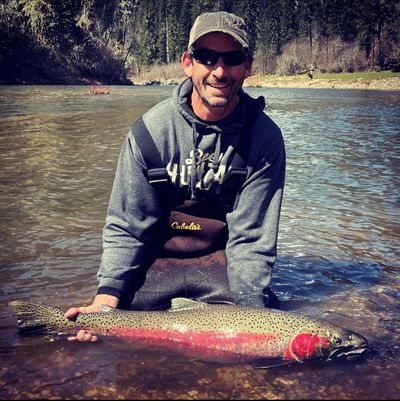After reeling in record-breaking steelhead, ethics of Boise man’s catch debated

When a Boise man reeled in an Idaho state-record steelhead, he also hooked a passel of controversy.
Scott Turner caught the 39.25-inch steelhead from the South Fork Clearwater River in April setting a state catch-and-release record. The achievement was promoted by Idaho Fish and Game in a news release, on Facebook and Instagram.
One vocal quarter of the angling community didn’t think highly of his catch. In particular, the Idaho Fish and Game Instagram post drew quick condemnation from anglers who believe it’s unethical to fish for steelhead so late in the season and so close to spawning beds, known as redds.
“The fact that you allow people to fish for spawning fish that could be wild in a river with crashing runs is disgusting,” wrote one commenter, summing up the general sentiment of the 90 or so comments. “April? Are you kidding me? They are on redds. Unsportsmanlike, short sighted and just plain dumb.”
Joe DuPont, the regional fisheries manager for IDFG at Lewiston, said he was “disappointed about all the negativity” although it wasn’t completely unexpected. The critics “don’t understand the whole story,” he said.
“The concerns from anglers is that we’re fishing these wild fish that are trying to spawn and reducing their survival,” he said. “In the vast majority of the case, that’s not the case.”
Instead, DuPont said, the fish that Turner caught was in all likelihood a hatchery fish put into the river by IDFG to be caught.
Nearly 85% of Idaho’s steelhead habitat is closed to fishing of all kinds. The areas that are open tend to be mainstem rivers that don’t provide great spawning habitat, he said.
“People do see fish spawning and you’re allowed to fish at the same time,” he said. “(But) the successful natural fish are in the tributaries.”
Steelhead fishing on the South Fork Clearwater remains open through Friday. This year’s return on the South Fork is the largest since 2017, according to DuPont.
That all may be true, said Gregory Fitz, the communications manager for the Wild Steelhead Coalition, but the optics remain bad.
“It just reeks of kind of clumsiness,” he said. “I think that’s half the issue here. These anglers aren’t doing anything that the community admires. Even if it’s legal. Even if its ecologically defensible. I think there is kind of a similar debate around baiting bears or baiting deer.”
Plus, Fitz doesn’t necessarily take IDFG at its word.
“As conservationists, we have absolute evidence to be skeptical of our fish and game departments based on the last century of management and the prioritization of opportunity above all else,” he said.
He points to 2019, when IDFG completely closed steelhead fishing on the Clearwater River in response to dismal returns.
“We’re at a dangerous inflection point for these fish,” he said. “The idea that spawners are getting beat up at the same time, it’s tough to square.”
The backlash highlights an ethical divide in the sport fishing world that extends beyond steelhead.
After all, its easiest to bag an animal – whether it’s a steelhead, bass or buck – during the breeding season. That’s when deer and fish are more willing to take risks. Hunting seasons are scheduled, in part, around this biological fact.
But as Brody Henderson, a writer for the MeatEater network observed, this ethic has changed for some in the angling community.
“Some fishermen have started choosing not to target spawning fish,” he wrote in a 2019 opinion article. “Fair chase ethics, in part, revolve around personal ideologies which can become problematic when anglers try to force their beliefs on others. This is especially true considering the case against fishing for spawners seems to only apply to certain species, but even then there are often logical inconsistencies.”
Fitz agrees that ethical question is a “social construction” and not uniformly applied to all species. Because steelhead are struggling, he believes the ethic of not fishing for spawners, regardless of whether they’re hatchery raised or not, is the prudent course.
“We don’t fish spawners because we can’t spare the fish,” he said. “We can’t risk the impacts. And the ethics have grown out of that. So it’s distasteful when we see people doing it.”
As for Turner, he said he’s received some critical comments, as has his girlfriend, who was fishing with him when he caught the state record. The fish he caught in April was swimming up a river and not near a redd.
“There are a lot of other problems that I feel like are much larger than a guy and his girlfriend going up to catch a couple steelhead, take some pictures and release them,” he said.